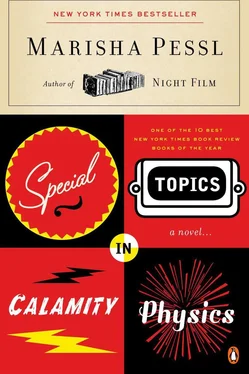I climbed out of bed, stumbled into the bathroom, splashed water on my face. In the mirror, my eyes looked unusually large, my face thin. I was cold, so I pulled the comforter off my bed, wrapped it around me and walked with it down the stairs.
“Dad! Did you call the school?”
I entered the kitchen. It was empty. The clinking I’d heard was the breeze through the open window hitting the silverware wind chime over the sink. I switched on the downstairs light and called into the stairwell.
“Dad!”
I used to dread a house without Dad in it. It could feel empty as a can, a shell, a blind desert skull of a Georgia O’Keefe painting. Growing up, I had a variety of techniques to avoid the truth of the house without Dad. There was the Watch General Hospital with Very Loud Volume (surprisingly comforting, more than one would imagine) and the Put On It Happened One Night (Clark Gable without an undershirt could distract anyone).
Late morning light poured through the windows, bright and vicious. I opened the refrigerator and saw with some surprise he’d made a fruit salad. I reached in, picked out a grape, ate it. Also in the refrigerator was lasagna, which he’d attempted to cover with too small a piece of tinfoil; it left two corners and a side exposed like a winter coat leaving entire shins bare, half the person’s arms and neck. (Dad was always unable to correctly eyeball the required length for tinfoil.) I ate another grape and called his office.
The Political Science Department assistant answered the phone.
“Hey, is my dad there? It’s Blue.”
“Hmm?”
I glanced at the clock. He didn’t have a class until 11:30 A.M. “My dad. Dr. Van Meer. Can I talk to him please? It’s an emergency.”
“He’s not coming in today,” she said. “There’s that conference in Atlanta, right?”
“Excuse me?”
“I thought he went to Atlanta, replacing the man who was in the car accident—?”
“What?”
“He requested permission for a substitute this morning. He won’t be in for the—”
I hung up.
“Dad!”
I left the comforter in the kitchen, raced down the stairs to his study, switching on the overhead light. I stood in front of his desk, staring at it.
It was bare.
I yanked open a drawer. It was empty. I yanked open another. It was empty. There was no laptop, no legal pads, no desk calendar. The ceramic mug was empty too, where he usually kept his five blue ink pens and five black ink pens next to the green desk lamp from the agreeable Dean at the University of Arkansas at Wilsonville, which also was gone. The tiny bookshelf next to the desk was completely empty too, apart from five copies of Marx’s Das Kapital (1867).
I sprinted up the stairs, through the kitchen, down the hall, yanking open the front door. The blue Volvo station wagon was parked where it always was, in front of the garage door. I stared at it, at the egg-blue surface, the rust around the wheels.
I turned back inside and ran to his bedroom. The curtains were open. The bed was made. Yet his old sheepskin loafers purchased at Bet-R-Shoes in Enola, New Hampshire, were not capsized beneath the television, nor were they beneath the upholstered chair in the corner. I moved toward the closet and slid open the door.
There were no clothes.
There was nothing — nothing but hangers jittering along the pole like birds, frightened when people stepped too close to the bars to stare at them.
I ran into his bathroom, swung open the medicine cabinet. It was bare. So was the shower. I touched the side of the tub, feeling its stickiness, the few remaining drops of water. I looked at the sink, a trace of Colgate toothpaste, a tiny drop of shaving cream dried on the mirror.
He must have decided we’re moving again, I told myself. He went to fill out a Change-of-Address card at the Post Office. He went to the supermarket for moving boxes. But the station wagon wouldn’t start, so he called a taxi.
I went into the kitchen and played the answering machine, but there was only the message from Eva Brewster. I looked on the counter for a note, but there wasn’t one. Again, I called the Political Science Department assistant, Barbara, pretending I knew all about the conference in Atlanta; Dad said there was “a motor-mouth on Barbara, coupled with the foul stench of the ridiculous.” (He cheerfully referred to her as “the Haze woman.”) I called the conference by a specific name, quickly decided beforehand. I think I called it SPOUFAR, “Safe Political Organization for the Upholding of First Amendment Rights,” or something to that effect.
I asked her if Dad had left a number where she could contact him.
“No,” she said.
“When did he notify you?”
“Left a message at six this morning. But, wait, why don’t you—?”
I hung up.
I wrapped the comforter around me, turned on the television, watched Cherry Jeffries in a yellow suit the color of a road sign with shoulder pads so sharp they could cut down trees. I checked the clock in the kitchen, the clock in my bedroom. I walked outside and stared at the blue station wagon. I sat in the driver’s seat and turned the key in the ignition. It started. I ran my hands along the steering wheel, over the dashboard, stared at the backseat, as if there might be a clue somewhere, a revolver, candlestick, rope or wrench carelessly left behind by Mrs. Peacock, Colonel Mustard or Professor Plum after killing Dad in the library, conservatory or billiard room. I examined the Persian carpets in the hall, searching for singular imprints of shoes. I checked the sink, the dishwasher, but every spoon, fork and knife had been put away.
They’d come for him.
Members of Nächtlich had come for him in the night, placed a linen handkerchief (embroidered with a red N in the corner) dabbed with a bit of sleeping potion over his unsuspecting snoring mouth. He hadn’t been able to struggle because Dad, although tall and hardly skinny, wasn’t a fighter. Dad preferred intellectual debate to physical assault, eschewed contact sports, considered wrestling and boxing “faintly preposterous.” And although Dad respected the art of karate, judo, tae kwan do, he himself had never learned a single move.
They’d meant to take me, of course, but Dad had refused. “No! Take me instead! Take me!” And so the Nasty One — there was always a Nasty One, the one who had scant regard for human life and bullied the others — pressed a gun to his temple and ordered him to call the university. “And you’d better sound normal or I’ll blow your daughter’s brains out while you watch.”
And then they made Dad pack his own bags in the two large Louis Vuitton duffle bags June Bug Eleanor Miles, age 38, had given to Dad so he’d remember her (and her spiky teeth) every time he packed his bags. Because even though, sure, they were “revolutionaries” in the classical sense of the word, they were not barbarians, not South American guerrillas or Muslim extremists who relished the odd beheading every now and then. No, they held fast to the belief that all human beings, even those held against their will, waiting for certain political demands to be met, required his/her personal belongings, including corduroy pants, tweed jackets, wool sweaters, Oxford shirts, shaving kits, toothbrushes, razors, soaps, dental floss, peppermint exfoliating foot scrubs, Timex watches, GUM cufflinks, credit cards, lecture notes and old syllabi, notes for The Iron Grip .
“We want you to be comfortable,” said the Nasty One.
That night, he still hadn’t called.
No one had, with the exception of Arnold Lowe Schmidt of The New Seattle Journal of Foreign Policy , telling the machine how thawry he was that Dad had declined hith invitathon of writhing a cover pieth on Cuba, but to pleath keep the periodical in mind if he wanthed “a preeminent repothitory for the publicathon of hith ideath.”
Читать дальше












